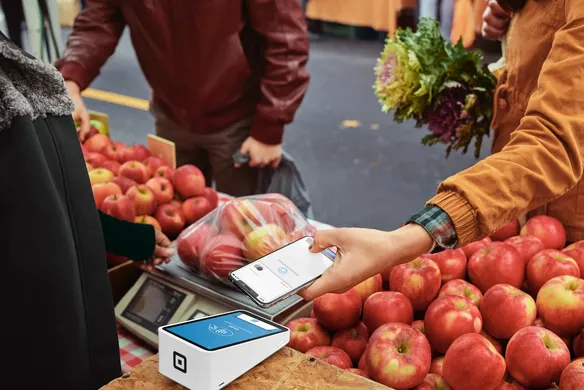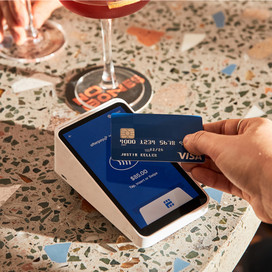Table of contents
With Australian consumers increasingly preferring to use electronic payment methods, many businesses are considering a cashless future. As a nation, we’ve been quick to embrace mobile and contactless payments – in fact, global market research firm Research and Markets predicts that Australia could become the Asia Pacific’s first cashless society by 2022.
In 2020, COVID-19 has transformed the way we transact. With concerns over health, safety and hygiene top of mind, many brick-and-mortar businesses have transitioned to an online operating model complete with contactless payment and delivery. Those who continue to operate a physical shopfront are seeking to minimise the use of cash for face-to-face transactions.
As the world navigates an uncertain path to a ‘new normal’, what is certain is that the way we buy and sell is unlikely to return to a pre-coronavirus approach. With more and more businesses considering a cashless operating model, here are some tips for making the move.
What is a cashless society?
A cashless society is one where financial transactions happen digitally rather than via the transfer of physical currency. In a cashless society, cash is replaced by a digital equivalent such as credit and debit cards, internet banking, mobile wallets, payment apps, cashless point of sale (POS) systems and other modes of digital payment.
How does Australia compare to the rest of the world when it comes to going cashless?
The Reserve Bank’s 2019 Consumer Payments Survey reported that Australians are continuing to switch from cash to electronic payment methods. The survey found that debit cards were the most common method of payment in 2019 (44% of all transactions), with just 27% of payments made with cash.
With the coronavirus pandemic propelling a dramatic shift away from cash, Australia is closer to being cashless than ever before. A new Square report – Cashless Payments and the Pandemic in Australia – found that 36% of businesses were effectively cashless during the height of COVID-19 stay-at-home orders mandated in April, up from 7% pre-pandemic.
What are the business benefits of going cashless?
Businesses who have transitioned to a mostly cashless operating model are finding:
- Cashless is more efficient: Encouraging cashless payment via tap-and-go, click-and-collect, or pre-paid mobile app means a more convenient customer experience – and the ability to serve customers more quickly.
- Cashless is safer: Keeping less cash on hand reduces the risk of theft and improves safety for your employees and customers. It also means fewer trips to the bank to make deposits or withdrawals.
- Cashless makes accounting easier: Digital payments mean that every transaction is automatically recorded, allowing you to reclaim the time you’d usually spend counting and reconciling cash payments.
- Cashless provides valuable reporting: Running a predominantly cashless business gives you access to real-time insights and data that you can use to identify trends and improve the way you operate.
What are some tips for transitioning to a cashless business?
If you’re looking to go cashless, there are a few things to keep in mind.
- Consider your customer base: Before committing to a cashless future, consider your customers and how they might react. Post-COVID, you’re likely to come up against less resistance than you might have a year ago, but some consumers (particularly those in the routine) might still prefer to pay with cash.
- Offer a range of payment options: If you’re asking customers to make digital payments, give them choice about how they pay. Payment solutions like Square Contactless Reader and Square Virtual Terminal allow your business to accept a range of payment methods, whether you’re transacting online, face-to-face or over the phone.
- Explore API options: An API (application programming interface) is a piece of software that allows two different applications to talk to each other. APIs will allow you to seamlessly integrate all the aspects you need to run your business – for example, bookings, online ordering, point of sale and delivery. Square’s Point of Sale API and E-Commerce API allow you to process in-person and online payments with seamless integration.
- Make security a priority: Users who are reluctant to use cashless payment methods often cite security and data protection concerns. You should partner with a known and trusted provider who offers PCI DSS compliance, demonstrating that your business accepts, stores and processes customers’ financial information safely and securely.
- Think about a digital loyalty program: Digital payments provide an excellent opportunity for you to reward regular customers with a customer loyalty program. Programs like Square Loyalty allow you to enrol and reward customers from your POS, driving more repeat business and higher spends.
- Don’t reject cash altogether: While refusing to accept cash is not against the law in Australia, most businesses who are transitioning to cashless continue to accept cash payments on a discretionary basis. If you decide to remove cash from your operations completely, you must make it clear that cash is not accepted before a transaction begins.
- Look for ways to use payment data: If you’re capturing all transactions electronically, you’ll have access to a complete picture of your business’s performance. This rich data will allow you to make informed decisions about improving the way you operate to drive growth. Tools like Square Analytics provide rich, real-time data and customer insights that will allow you to identify your most popular product categories, busiest periods, emerging sales trends and more.
With electronic payments on a steep upward trajectory and COVID-19 continuing to drive concerns about cash payments, it makes sense for businesses to consider a cashless future. Going cashless presents some challenges to navigate, but the upside is complete transparency of your operations, allowing business owners to leverage rich, real-time reporting and make decisions with confidence.
If you’re ready to get started accepting cashless payments for your business, Square can have you up and running in minutes. We offer a range of tools for businesses to accept electronic payments quickly, easily and securely, including hardware solutions like Square Terminal and online solutions like Square Invoices. Find out more at our website.
Square AU Pty Ltd ABN 38 167 106 176, AFSL 513929. Square’s AFSL applies to some of Square AU’s products and services but not others. Please read and consider the relevant T & C’s, Financial Services Guide and PDS before using Square’s products and services to consider if they are right for you.
![]()











